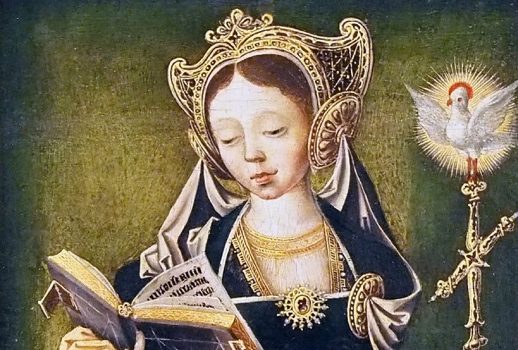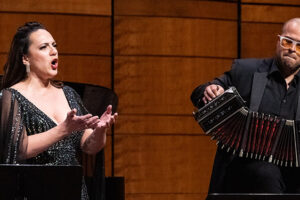

They had a subject in a not very dramatic narrative poem of 1822 about the martyrdom of Saint Margaret in Syria (herein Margarita) in the time of the Emperor Diocletian. There is no evidence that this much-beloved lady ever existed, but few saints (or gods) are much inconvenienced by that sort of detail.
In the legend and in art, she was swallowed by a dragon, without harm to her body or her faith, and it would have been amusing to hear Sullivan’s musical depiction of such an event so soon after Wagner had introduced his dragon, but Gilbert altered the martyrdom to an ecstatic assumption from an unlit pyre. Perhaps that was more Sullivan’s speed.
The story, of a bride who rejects her pagan love after a Christian revelation of the joys of chastity, had been used by Donizetti in Les Martyrs and would later inspire Refice’s Cecilia; indeed, in 1898, The Martyr of Antioch itself was staged as an opera. But its structure is decidedly oratorical, that is, the chorus has far more to do than the soloists, hefty as their parts may be, in setting the mood and acting out the drama. Festival presentation (at Leeds, by a chorus of three hundred and an orchestra of over one hundred) was The Martyr’s most natural home.
Utopia Opera cannot command such spectacular forces, but that has never prevented them from doing right by sizable pieces at their usual home of Lang Hall at Hunter College. For The Martyr’s American premiere, they have dashed across town to the Rutgers Presbyterian Church on West 73rd Street, across the street from the mammoth portals of the Ansonia.
The room has a striking acoustic that thrust the sound of a small chorus and orchestra to a brilliant, thrillingly focused presence. No one at Saturday evening’s performance felt shortchanged on acoustical grounds.
Reviewers of the 1880 premiere, if they had a cavil, suggested that Sullivan had given the pagan crowds, youths and maidens cheerfully invoking Apollo, far too likeable music to sing. Indeed, the chorus’s only Christian moment was an a cappella funeral anthem, whose subdued ecstasies and lack of frivolous instrumentation brought a fine, serious air of the catacombs to the event.
It was clever of Sullivan, a highly experienced composer of hymns and anthems, to devise such a contrast to the flashy pagan rituals he also depicts, and the Utopia chorus performed it with understated elegance. But the pagan choruses were merry without undue hilarity, and the attraction of such a faith to the crowd that later condemns Margarita made her determined defiance the more impressive. In any case, the varying of texture is (as so often in Sullivan’s operettas) testimony to his orchestral wisdom and melodic imagination.
The singers gathered by Utopia were more than satisfactory. Alexis Cregger possesses, besides a beautiful dramatic soprano, fine diction and terrific presence for her many lines of rather Gluck-like declamation, and the assurance of a Christian maiden of rock-solid conviction.
The trouble with her role—and this, I think, is the reason for the failure of the oratorio to win a place in the repertory—is that she has no personality, no self-doubt, no crisis of faith. She is fixed as a rock, which may be admirable but is quite unappealing. Sullivan can bring her to eternal life, but he fails to bring her to dramatic life. Cregger, frankly, gave the composer better than he gave her.
Mezzo Carolyn Tye, as the priestess Julia,seemed equally assured of her pagan faith in rather merrier music—I especially liked her hymn to Apollo. Adam C. J. Klein, the pagan prefect who hopes to win Margarita’s hand, sang of the delights of the wealth he offered her with an ardent tenor, easily roused to dramatic, room-filling sonorities when his desires were defied. Duncan Hartman’s bass seemed a bit woolly and unfocused in the Oroveso role, Margarita’s priestly and despairing father.
These voices blended handsomely in a quartet as three of them entreated Margarita’s return to pagan ways and she defied them, without the slightest sign of doubt. Indeed, her stiff certitude made her less human and sympathetic than she might have been had she been, say, fearful of the martyrdom to come. (Compare Handel’s Theodora or Mendelssohn’s St. Paul.) Sullivan dealt more complexly, and intriguingly, with the certainties of Josephine Corcoran, Phoebe Merrill, even Princess Ida.
William Remmers, Utopia’s lively and learned conductor, did astonishing work in making us feel the weight and glamour Sullivan intended to produce at Leeds with these far smaller forces and in a far less Victorian circumstances. It was good to hear this able score and its many winsome melodies, but the witty twists and turns and startling innovations of Sullivan’s operettas are not to be sought here, and even so amiable a presentation is not going to bring his dead serious religiosity back into popular favor.























Comments